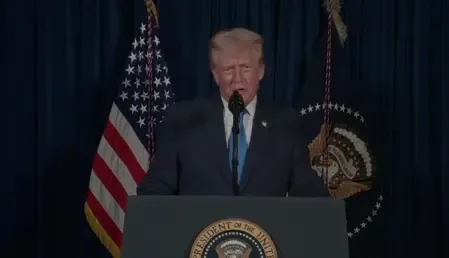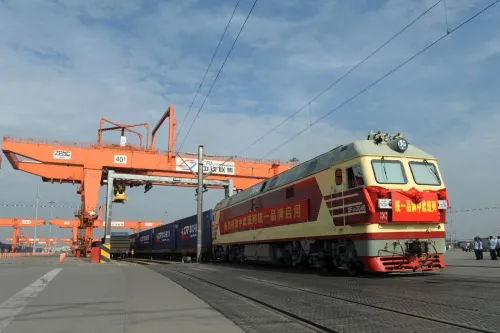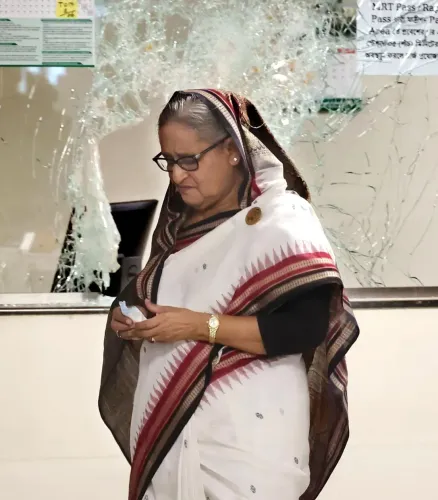India and Thailand Forge a Future-Oriented Strategic Partnership

Synopsis
Key Takeaways
- Strategic Partnership established between India and Thailand.
- Focus on enhancing defense technology and collaboration.
- Regular dialogues on security and law enforcement.
- Strengthening economic ties and trade relations.
- Commitment to a resilient Indo-Pacific region.
Bangkok, April 4 (NationPress) By upgrading their bilateral ties to a Strategic Partnership, India and Thailand are set to enhance the mechanisms governing defence collaboration. The focus will be on advancing partnerships within the defence sectors of both nations, particularly in areas such as defence technology, industry, research, training, exchanges, exercises, and capacity building through the establishment of suitable frameworks.
The Joint Declaration regarding the India-Thailand Strategic Partnership was issued after discussions between Prime Minister Narendra Modi and his Thai counterpart Paetongtarn Shinawatra. This declaration emphasizes a mutual commitment to enhance bilateral relations, aiming for ongoing peace, stability, and prosperity for both nations and their regions.
This development signifies a new era of strengthened partnership aimed at unlocking the full potential of cooperation between India and Thailand.
Recognizing their shared civilizational, cultural, religious, and linguistic ties, as well as the 78-year history of diplomatic relations, both leaders engaged in comprehensive discussions on various aspects of bilateral cooperation. These include defence, security, trade, investment, connectivity, science, technology, innovation, space, education, health, culture, tourism, and people-to-people interactions.
They also discussed sub-regional, regional, and multilateral topics of mutual interest. Several MoUs were exchanged, and the establishment of an India-Thailand Consular Dialogue was welcomed.
The Strategic Partnership will lay a crucial foundation for both countries to explore future-oriented and mutually beneficial paths towards greater opportunities, enhanced cooperation, and collective responses to shared challenges.
This partnership will build on existing agreements covering political, defence, security, trade, investment, connectivity, education, socio-cultural development, and other areas of mutual interest.
In declaring this partnership, the leaders reiterated their commitment to a free, open, transparent, and inclusive Indo-Pacific region, and expressed strong support for ASEAN Centrality, as stated in the Joint Declaration.
They also reaffirmed their intention to pursue concrete actions to implement the ASEAN-India Joint Statement on cooperation regarding the ASEAN Outlook on the Indo-Pacific (AOIP), promoting peace, stability, and prosperity through enhanced cooperation between AOIP and the Indo-Pacific Oceans Initiative (IPOI). Thailand's role in co-leading the Maritime Ecology Pillar of the IPOI alongside Australia was also acknowledged.
Both leaders tasked the Ministry of Foreign Affairs of Thailand and India’s Ministry of External Affairs (MEA) with coordinating the development of a 'Joint Plan of Action' to effectively implement the Strategic Partnership.
To bolster security cooperation, regular dialogues and exchanges between security and law enforcement agencies will be established, including a strategic dialogue at the Deputy National Security Adviser/Secretary General level between the Thai National Security Council and India’s National Security Council Secretariat. This aims to address the increasingly complex global and regional security landscape, covering both traditional and non-traditional security matters such as defence, maritime security, cybersecurity, counterterrorism, law enforcement issues, and combating transnational organized crime.
Both countries will also focus on improving all forms of connectivity—physical, digital, and financial—between India and Thailand, while strengthening regional ties. This includes fast-tracking the India-Myanmar-Thailand Trilateral Highway and its eastern extension, as well as the India-Myanmar-Thailand Motor Vehicles Agreement. They will enhance regional maritime connectivity via coastal shipping and fortify port-to-port connections, encouraging civil aviation authorities to pursue discussions to enhance air connectivity.
Building on existing economic, trade, and investment relations, regular meetings and exchanges will be scheduled between the respective Ministries of Commerce of both countries under the existing framework of the Joint Trade Committee.
Annual meetings of existing mechanisms to promote trade and investment are to be ensured, with the aim of facilitating trade and addressing market access challenges. This will strengthen both countries' links to the global supply chain and enhance private sector confidence. Cooperation will also include harmonization, equivalence, and mutual recognition of standards in agreed areas, while preparing for new trade and investment avenues in forward-looking industries such as renewable energy, electric vehicles, digital technology, robotics, ICT, space technology, biotechnology, creative industries, and startups.
With bilateral trade reaching around US$ 15 billion in 2023-24, both countries aim to enhance sustainable bilateral trade to achieve its full potential through the expansion of economic connections in promising areas. Sustainable trade includes sectors such as value-added marine products, smartphones, electrical vehicles, food processing, petroleum products, auto components, services, and pharmaceuticals.









